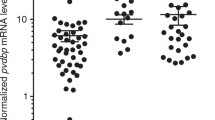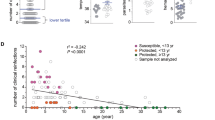Abstract
AFRICAN Burkitt's lymphoma (BL) is a malignant tumour of children most common in areas having holoendemic malaria1,2. It occurs with a particularly high frequency in certain areas of Africa3, with sporadic cases in other areas including Europe and North America4–7. Malaria has been shown to have immunosuppressive effects8,9, and chronic malaria, in particular, causes repeated stimulation of the immune response to infections with plasmodia. It has also been proposed that the immunosuppressive action of malarial drugs may make the immune system more susceptible to cancer and may contribute to BL development. Chloroquine is widely used as an antimalarial agent and also in the therapy of connective tissue diseases10,11. It is thought to act by forming molecular complexes with plasmodial DNA, causing inhibition of plasmodial DNA synthesis12–14. It has been suggested that chloroquine may play a part in the development of BL15. Another factor thought to be involved in the aetiology of the African form of BL is the Epstein–Barr virus. Virtually all BLs are EBV genome-carrying tumours and patients have high titres of antibody against EBV16,17 The most widely proposed hypothesis is that BL is due to EBV-induced malignant transformation of thymus-independent B lymphocytes17,18. It has been shown in vitro that EBV can induce transformation of resting human and simian lymphocytes which become established as permanent lines19,20. Almost all the cells in these lines contain EBNA (the EBV-induced nuclear antigen) and carry multiple copies of EBV DNA21,22. It has also been shown that EBV can induce lymphomas in experimentally infected monkeys23. However, the failure of EBV infection to have serious adverse effects in the great majority of humans indicates that interaction with some other factor, such as malaria or antimalarial drugs, must be involved in BL pathogenesis. We report here studies on the effect of chloroquine on the expression of EBV antigens. The data obtained indicate that chloroquine can activate the EBV cycle and the expression of EBV antigens.
This is a preview of subscription content, access via your institution
Access options
Subscribe to this journal
Receive 51 print issues and online access
$199.00 per year
only $3.90 per issue
Buy this article
- Purchase on Springer Link
- Instant access to full article PDF
Prices may be subject to local taxes which are calculated during checkout
Similar content being viewed by others
References
Burkitt, D. P. Int. Rev. exp. Path 2, 67–138 (1963).
Klein, G. in The Herpes Viruses (ed. Kaplan, A.) 521–555 (Academic, New York, 1973).
Burkitt, D. Br. J. Surg. 46, 218–223 (1958); Nature 194, 232–234 (1962).
Pagano, J. S., Huang, C. H. & Levine, P. New Engl. J. Med. 289, 1395–1399 (1973).
Levine, P. H. et al. Ann. intern. Med. 83, 31–36 (1975).
Ziegler, J. L. New Engl. J. Med. 297, 75–80 (1977).
Judson, S. C. & Henle, G. New Engl. J. Med. 297, 464–468 (1977).
Salaman, M. H., Wedderbum, N. & Bruce-Chwatt, L. J. J. gen. Microbiol. 59, 383 (1969).
Gazayerli, M. Bull. Int. Acad. Path. 4, 37 (1963).
Goodman, L. S. & Gilman, A. in The Pharmacological basis of Therapeutics, 5th edn, 1049–1053 (Macmillan, London, 1975).
Coatney, G. R. Am. J. trop. Med. Hyg. 12, 121–128 (1963).
Parker, F. S. & Irvin, J. L. J. biol. Chem. 199, 897 (1952).
Cohen, S. N. & Yielding, K. L. Proc. natn. Acad. Sci. U.S.A. 54, 521–527 (1965).
Karmali, R., Schiller, P. W. & Horrobin, D. F. Prostaglandins 12, 463–464 (1976).
Sadoff, L. Lancet ii, 1262–1263 (1973).
Henle, G. et al. J. natn. Cancer Inst. 43, 1147–1157 (1969).
Klein, G. New Engl. J. Med. 293, 1353–1357, 1975.
Olweny, C. L. M. et al. J. natn. Cancer Inst. 58, 1191–1196 (1977).
Pope, J. H., Horne, M. K. & Scott, W. Int. J. Cancer 3, 857–866 (1968).
Miller, G., Shope, T., Lisco, H., Stit, D. & Lipman, M. Proc. natn. Acad. Sci. U.S.A. 69, 383–387 (1972).
Lindahl, T. et al. Int. J. Cancer 13, 764–772 (1974).
Menezes, J., Leibold, W. & Klein, G. Expl Cell Res. 92, 478–484 (1975).
Shope, T., Dechario, D. & Miller, G. Proc. natn. Acad. Sci. U.S.A. 70, 2487–2491 (1973).
Pulvertaft, R. J. V. J. clin. Path. 18, 261–273 (1965).
Hinuma, Y. & Grace, J. T. Proc. Soc. exp. Biol. Med. 124, 107–111 (1967).
Covell, G., Coatney, G. R., Field, J. W. & Singh, J. Monograph Ser. W.H.O. 27 (1955).
Author information
Authors and Affiliations
Rights and permissions
About this article
Cite this article
KARMALI, R., HORROBIN, D., MENEZES, J. et al. Chloroquine enhances Epstein–Barr virus expression. Nature 275, 444–445 (1978). https://doi.org/10.1038/275444a0
Received:
Accepted:
Published:
Issue Date:
DOI: https://doi.org/10.1038/275444a0
This article is cited by
-
Effect of chloroquine on Epstein–Barr virus expression
Nature (1979)
Comments
By submitting a comment you agree to abide by our Terms and Community Guidelines. If you find something abusive or that does not comply with our terms or guidelines please flag it as inappropriate.



